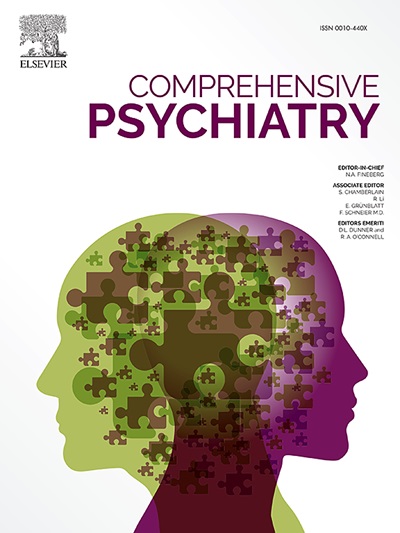瑞典青少年和青年难民的心理健康和福祉:有伴和无人陪伴个人的横断面研究。
IF 4.2
2区 医学
Q1 PSYCHIATRY
引用次数: 0
摘要
背景:目前,全世界大约有1亿人流离失所,其中包括儿童和年轻人。先前的研究表明,暴露于暴力和创伤后应激障碍(PTSD)在这一人群中很常见。然而,我们仍然缺乏关于幸福感、心理健康和功能的全面数据。方法:本研究纳入了2019年至2022年在瑞典全国招募的291名青少年(12-17岁)和年轻人(18-25岁)难民。社会人口学、心理健康和幸福相关数据(幸福感、创伤后应激症状、精神诊断和功能能力)采用带有结构化成分的半结构化访谈收集。使用线性和逻辑回归分析伴随状态与幸福感/抑郁/自杀念头、广泛性焦虑障碍/惊恐障碍/创伤后应激障碍症状和功能能力之间的关系,并根据年龄、性别、父母教育程度、庇护状态和原籍地区进行调整。研究结果:大多数研究参与者(平均年龄17.9岁)来自中东和北非(70.6%)或撒哈拉以南非洲(27.0%)。16.1%的青少年和32.3%的青年是无人陪伴的。几乎所有的研究样本都经历过暴力(92.8%)。然而,样本中精神病诊断的患病率较低。例如,只有5.9%的人符合临床抑郁症的标准。自我报告的幸福感(WHO-5, 71·09(23·91))和观察者评价的功能能力(GAS/GAF, 81·76(14·15))较高。不同性别的诊断患病率无显著差异。然而,陪伴组和无人陪伴组之间存在显著差异。作为一个无人陪伴的难民个体与较高的自杀念头风险相关,调整比值比为5.66 (95% CI 2.15 - 14.88),较高的创伤后应激障碍症状发生率β = 0.72(0.39 - 1.05),较低的心理幸福感β = - 10.86 95% CI(- 18.23 - - 3.48)和较低的功能能力β = - 9.38(- 13.84 - - 4.92)。除男性幸福感较差(β = 6·83(1·01-12·66))外,性别间无差异。解释:在这个样本中,我们发现与早期发表的研究相比,所有精神病诊断的患病率都较低。作为一个无人陪伴的难民个人是所有不利结果的一个风险因素。未来的研究需要证实相对较低的精神病诊断率。无论如何,调查结果凸显了新抵达难民的不同需求。本文章由计算机程序翻译,如有差异,请以英文原文为准。
Mental health and well-being in adolescent and young adult refugees in Sweden: A cross-sectional study of accompanied and unaccompanied individuals
Background
Currently, approximately 100 million people are displaced worldwide, including children and young adults. Previous studies showed exposure to violence and posttraumatic stress disorder (PTSD) are common in this sub-population. However, we still lack comprehensive data on well-being, mental health, and the ability to function.
Methods
This study included 291 adolescent (aged 12–17 years) and young adult (18–25 years) refugees recruited nationwide in Sweden between 2019 and 2022. Sociodemographic, mental health and well-being-related data (well-being, post-traumatic stress symptoms, psychiatric diagnoses, and functional ability) were collected using semi-structured interviews with structured components. Associations between accompanied status and well-being/depression/suicidal thoughts, generalized anxiety disorder/panic disorder/PTSD symptoms, and functional ability were analyzed using linear and logistic regression, adjusted for age, gender, parental education, asylum status, and region of origin.
Findings
Most study participants (mean age 17·9 years) originated from the Middle East and North Africa (70·6 %) or Sub-Saharan Africa (27·0 %). 16·1 % of adolescents and 32·3 % of young adults were unaccompanied. Nearly the entire study sample had experienced violence (92·8 %). However, the sample had a low prevalence of psychiatric diagnoses. For example, only 5·9 % fulfilled the criteria for clinical depression. Self-reported well-being (WHO-5, 71·09 (23·91)) and observer-rated functional ability (GAS/GAF, 81·76 (14·15)) were high. There were no significant differences in diagnosis prevalence by gender. However, significant differences existed between accompanied versus unaccompanied groups. Being an unaccompanied refugee individual was associated with a higher risk of suicidal thoughts, adjusted odds ratio, aOR 5·66 (95 % CI 2·15–14·88), higher rates of post-traumatic stress disorder symptoms β = 0·72 (0·39–1·05), lower mental well-being β = −10·86 95 % CI (−18·23— -3·48) and lower functional ability β = −9·38 (−13·84— -4·92). There were no differences in outcomes by gender except for worse well-being in males (β = 6·83 (1·01–12·66)).
Interpretation
In this sample, we found lower prevalence rates for all psychiatric diagnoses compared to earlier published studies. Being an unaccompanied refugee individual was a risk factor for all adverse outcomes. Future studies need to confirm the relatively low rates of psychiatric diagnoses. Regardless, the results highlight the heterogeneous needs among newly arrived refugees.
求助全文
通过发布文献求助,成功后即可免费获取论文全文。
去求助
来源期刊

Comprehensive psychiatry
医学-精神病学
CiteScore
12.50
自引率
1.40%
发文量
64
审稿时长
29 days
期刊介绍:
"Comprehensive Psychiatry" is an open access, peer-reviewed journal dedicated to the field of psychiatry and mental health. Its primary mission is to share the latest advancements in knowledge to enhance patient care and deepen the understanding of mental illnesses. The journal is supported by a diverse team of international editors and peer reviewers, ensuring the publication of high-quality research with a strong focus on clinical relevance and the implications for psychopathology.
"Comprehensive Psychiatry" encourages authors to present their research in an accessible manner, facilitating engagement with clinicians, policymakers, and the broader public. By embracing an open access policy, the journal aims to maximize the global impact of its content, making it readily available to a wide audience and fostering scientific collaboration and public awareness beyond the traditional academic community. This approach is designed to promote a more inclusive and informed dialogue on mental health, contributing to the overall progress in the field.
 求助内容:
求助内容: 应助结果提醒方式:
应助结果提醒方式:


